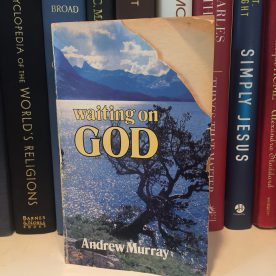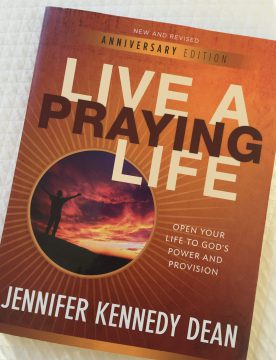(Note: This post is part 2 of a 4-part series on praying, trusting, and discovering the “unbroken enjoyment” of waiting on God. If you missed last week’s post, click here.)

When Robbie and I got married, we put Psalm 84:11 on the front of our wedding program: For the Lord God is a sun and shield: the Lord bestows favor and honor; no good thing does he withhold from those whose walk is blameless.
We loved that verse. We felt like God had blessed us with incredible favor already, and since we were technically “blameless” (the stain of our sin having been washed clean by the blood of Christ), we looked forward to a lifetime of more “good things” from our Heavenly Father.
That was 30-plus years ago.
In the past three decades, we’ve seen more good things than we could ever have imagined. But we’ve also seen more heartache, disappointment, and prayers that didn’t get answered (at least not in the way we would have liked). Given the perspective of time, some of these losses are easy to understand (e.g., my failed audition as a radio DJ), but some of them are much harder. Why, for instance, did God “withhold” the miracle we prayed for, when my sweet father was diagnosed with brain cancer at age 60?
Why didn’t we get the house we so desperately wanted to buy? Why did my dear friend’s marriage fall apart? Why didn’t God protect us from making that bad investment? Why didn’t my child get into that school…make that team…get invited to that birthday party? Why do I sometimes feel (like it says at the end of Psalm 88) like “darkness is my closest friend”?
I know you share those questions. We all have them. And when we ask God for something that we know is a really good thing – like the salvation of a loved one, or freedom from a crippling addiction – and he stays silent, that can be confusing. Frustrating. Faith-shaking, even.
I won’t pretend to have all the answers. But in my own journey (which has been shaped and supported by authors whose brains are much bigger than mine), I’ve found a few anchors that have helped to keep my faith in place. Maybe one of these mooring hooks will help you, too:

Andrew Murray (whose classic, Waiting on God, served as the backdrop to last week’s post) says that in “every true prayer, there are two hearts in exercise. The one is your heart, with its little, dark, human thoughts of what you need and God can do. The other is God’s great heart, with its infinite, its divine purposes of blessing.”
I get the two-hearts thing. I know God has the power to move any mountain he wants to, so when I don’t get what I want in prayer (either for myself or for a loved one), I figure the problem can be traced to one of two things: Either I was wrong (in that what I wanted was not, actually, a good thing at that time), or God was (because it was good, and he didn’t deliver). Given those two choices – the desires of my little, dark, human heart, or those of God’s great, divine, purposes-of-blessing heart – I know which one I’d better pick.
Jennifer Kennedy Dean builds on this theme in her study, Live a Praying Life (which, incidentally, is hands-down my favorite Bible study on prayer):

She says that God wants us to grow in things like tenacity and perseverance, and that when it looks like God is moving slowly (or not at all), he is “putting pieces together that you had not thought of.”
I get that, too. God rarely does things in the way, or on the timetable, that I would. That should come as no surprise, given verses like Isaiah 55:8 (which says that God’s ways are not our ways), but I spend more time than I care to admit trying to figure out what he’s up to. I know his plans are good, and I know he loves me…but sometimes, the stuff he does looks an awful lot like a whoopsie.
Dean has been there. But, in looking at the lives of folks who’ve gone through more than a few of those tricky places (guys like Joseph, who thought he was supposed to be a ruler but wound up being sold as a slave), she warns us not to mistake God’s will for his ways, or confuse what he is doing with how he is doing it. We only see part of the picture. And, she writes, “We cannot control God or tell him how to accomplish his plan.” That one may seem obvious, but trust me: When you have as many good ideas for God as I think I do, it can be hard to just sit back and wait. It can be tough to pipe down. And during those seasons when you spend the whole night weeping, it can be a stretch to believe the Psalm 30:5 promise that joy comes in the morning.
Because morning can seem like a long way off.
So what do we do? Where do we turn, when we feel like God has left us hanging, or that whatever he is doing is so mysterious, or is taking so long, that he might as well be doing nothing? How do the unexpected outcomes and disappointments of our lives (as well as God’s apparent silence in the face of these things) square with the promise on our wedding program, that “no good thing will he withhold”?
Again, I don’t have all the answers. But, more than 30 years after Robbie and I walked down that aisle, I finally noticed that our wedding psalm doesn’t end with verse 11. There’s more. Psalm 84:12 (the last verse in the psalm) says this: “Lord Almighty, blessed is the one who trusts in you.”
And that, I think, is the key.
It’s not “Blessed is the one who trusts in the good things you give.” Or, “Blessed is the one who trusts in your favor.” It’s “Blessed is the one who trusts in you.”
And what I am finding out is that, when I pray, I often get it backwards. My trust is in the wrong place. Instead of trusting in God, I am trusting in an outcome. Instead of looking for him, I am looking for the blessings he provides. Instead of desiring the Giver, I am consumed with desire for the gift.
And when I don’t get what I want, I am sad.
I’ll deal with that next week – with what we do with the grief and anger that sometimes accompany unexpected or unwanted outcomes – but since this post is already too long, I’ll just leave you with some of the questions I am pondering this week:
If all we have is Jesus, is that enough?
Are we willing to explore the blessedness (the “unbroken enjoyment of waiting”) that comes with putting our trust in God?
And, at the end of the day, are we willing to settle for the gifts…or do we want to press in and behold the Giver?















